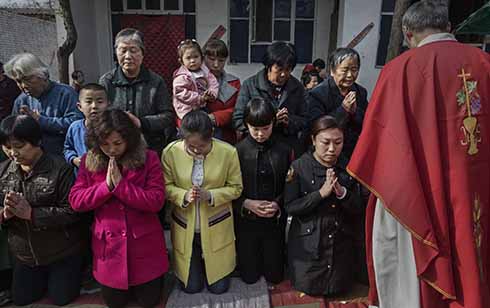 Pope Francis' intention for March: 'We pray that the Church in China may persevere in its faithfulness to the Gospel and grow in unity'.
Pope Francis' intention for March: 'We pray that the Church in China may persevere in its faithfulness to the Gospel and grow in unity'.
Pope Francis’ prayer for the Church in China is timely. It comes in a year when the attention of Australians and of people in other nations has been focused on China. China’s strong assertion of its role in its region and the rest of the world has led to reaction among its economic and political competitors.
It has also focused attention on the denial in China of what we would see as basic human rights. This inevitably trickles down into popular prejudice against China and xenophobic public comment. We risk thinking of Chinese people as a bloc, not as persons, to blame them for coronavirus rather than to go out to them in compassion for suffering from it.
GOOD TIME TO REFLECT
For these reasons it a good time to reflect on our Chinese Catholic brothers and sisters and to pray for the Church in China.
Pope Francis reminds us that it is a community of different people who try to live by the Gospel and need God’s grace and the prayer of other Christians to do so. They display all the variety in ways of seeing and living their faith that we find in our own Church.
The challenge facing the Church in China is that Christianity has always been seen as foreign. It has come to China with foreigners and has been identified with them, even though Catholics themselves see themselves as happily both Chinese and Catholic.
Christianity first came to China with Persian traders. Stone monuments from the ninth century testify to its presence. Christianity flourished under the Mongolian rule in the fourteenth century, with many Bishops throughout China. Later Chinese Emperors declared it incompatible with Chinese customs and banned it.
Subsequent Chinese contacts with foreigners were mainly with traders admitted under strict conditions. Chinese rulers were torn between fear of European threats to the Kingdom and desire to benefit from its technology and learning.
COMMENDING CHRISTIAN FAITH
Matteo Ricci made his way into the court through his astronomical and other learning, hoping to find a way of commending Christian faith to educated Chinese through the gifts of their own culture. But the connections he described between Chinese culture and Christian faith were judged by Roman authorities to compromise faith. Seen as agents of foreign powers, Catholic missionaries were soon banned from China.
It is not surprising then that under Communist rulers who wanted to free China from foreign domination powers, Catholics were seen as agents of a foreign power ruled by the Pope. They have been alternately persecuted and tolerated under heavy scrutiny and political control.
They have also understandably been divided in their opinions about how far they should cooperate with the Government.
Pope Francis is anxious that these differences of opinion should not divide them as Catholics and as congregations. He prays, and asks us to pray, that they should be proud members of Christ’s universal church and of their nation, following Jesus’ generous way of life and rising with him to full life.
Image: Getty Images